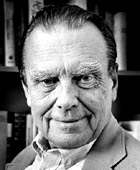Born in Szetejnie, Lithuania in 1911, died 14 August 2004 in Cracow. Poet, novelist, essayist and translator. He won the Nobel Prize for Literature in 1980 and has won several other prestigious awards, including a 1976 Guggenheim Fellowship, the 1978 Neustadt Prize, and the 1989 National Medal for the Arts. His work has been translated into more than a dozen languages. He holds many honorary doctorates from American and Polish universities. He is an honorary citizen of Lithuania and of the city of Cracow.
He spent his youth and studied law in Vilnius, where he also published his first poems. During the German Occupation he lived in Warsaw. After the war, he served in the Polish diplomatic service in the USA and France until 1951, when he sought political asylum in France. In 1960, he left France for California, where he spent more than twenty years as Professor of Slavic Languages and Literatures at the University of California Berkeley. Until 1989, most of his publications were in the Paris emigre journal "Kultura" or in the underground press in Poland. He has divided his time between Berkeley and Cracow since 1989.
Critics from many countries, as well as contemporary poets (like Joseph Brodsky, for instance), approach Milosz's literary output in superlatives. His poetry is rich in visual-symbolic metaphor. The idyllic and the apocalyptic go hand-in-hand. The verse sometimes suggests naked philosophical discourse of religious epiphany. Songs and theological treatises alternate, as in the "child-like rhymes" about the German Occupation of Warsaw in THE WORLD: NAIVE POEMS (1943) or SIX LECTURES IN VERSE from the volume CHRONICLES (1987). Milosz transcends genre. As a poet and translator, he moves easily from contemporary American poets to the Bible (portions of which he has rendered anew into Polish).
As a novelist, he won renown with THE SEIZURE OF POWER (1953), about the installation of communism in Poland. Both Milosz and his readers have a particular liking for the semi-autobiographical THE ISSA VALLEY (1955), a tale of growing up and the loss of innocence that abounds in philosophical sub-texts. There are also many personal themes in Milosz's essays, as well as in THE CAPTIVE MIND (1953), a classic of the literature of totalitarianism. NATIVE REALM (1959) remains one of the best studies of the evolution of the Central European mentality. THE LAND OF ULRO (1977) is a sort of intellectual and literary autobiography. It was followed by books like THE WITNESS OF POETRY (1982), THE METAPHYSICAL PAUSE (1995) and LIFE ON ISLANDS (1997) that penetrate to the central issues of life and literature today.
|






